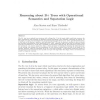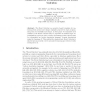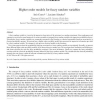150 search results - page 5 / 30 » A logic for reasoning about the probability of fuzzy events |
ENTCS
2008
13 years 8 months ago
2008
The B+ tree is an ordered tree structure with a fringe list. It is the most widely used data structure for data organisation and searching in database systems specifically, and, p...
AGI
2008
13 years 10 months ago
2008
: Indefinite probabilities are a novel technique for quantifying uncertainty, which were created as part of the PLN (Probabilistic Logic Networks) logical inference engine, which i...
ICLP
1995
Springer
14 years 2 days ago
1995
Springer
Abstract. The Event Calculus is a narrative based formalism for reasoning about actions and change originally proposed in logic programming form by Kowalski and Sergot. In this pap...
FSS
2008
13 years 8 months ago
2008
A fuzzy random variable is viewed as the imprecise observation of the outcomes in a random experiment. Since randomness and vagueness coexist in the same framework, it seems reaso...
JOLLI
2006
13 years 8 months ago
2006
Abstract. Propositional dynamic logic (PDL) provides a natural setting for semantics of means-end relations involving non-determinism, but such models do not include probabilistic ...



